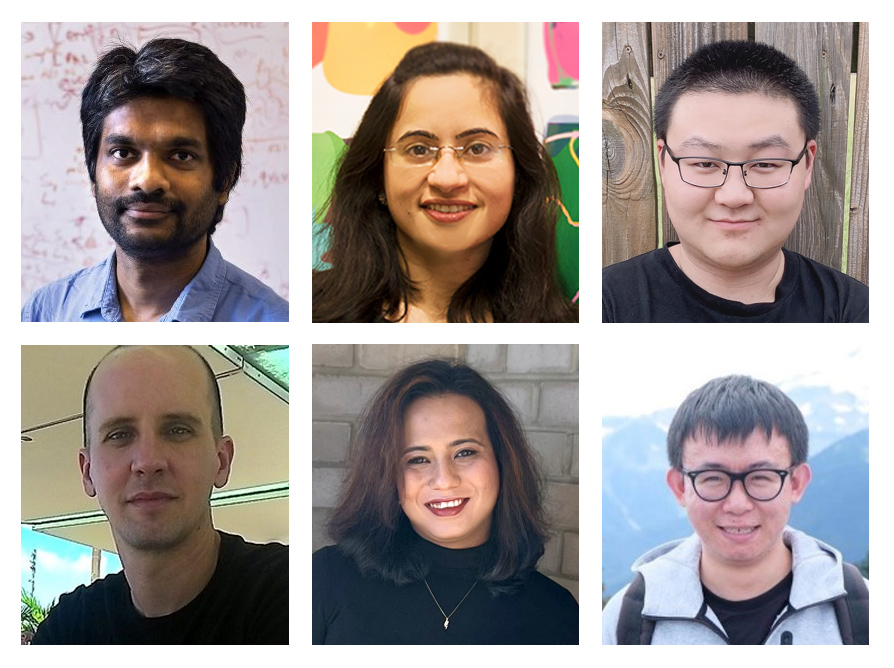
May 24, 2024
Top row, left to right: Mohit Bansal, Snigdha Chaturvedi, Tianlong Chen; Bottom row, left to right: Marc Niethammer, Roni Sengupta, Huaxiu Yao
UNC Computer Science personnel had 14 papers accepted by the 2024 International Conference on Learning Representations (ICLR). Five of the papers were selected for spotlight posters at the conference. The submissions came from six different research groups.
ICLR is a machine learning conference held annually since 2013. Accepted publications from UNC CS personnel covered topics ranging from large language models and large vision-language models to shape representation in computer vision, to generalizability and fairness in machine learning. Submissions came from research groups led by Professor Mohit Bansal, Assistant Professor Snigdha Chaturvedi, incoming Assistant Professor Tianlong Chen, Professor Marc Niethammer, Assistant Professor Roni Sengupta, and Assistant Professor Huaxiu Yao.
A roundup of the 14 publications can be found below, with brief descriptions of each paper selected for spotlight at the conference.
Papers selected for spotlight:
UNC CS personnel are bolded, and asterisks indicate equal contribution as lead-authors.
“Can Sensitive Information Be Deleted From LLMs? Objectives for Defending Against Extraction Attacks”
Vaidehi Ramesh Patil*, Peter Hase*, Mohit Bansal
Studying extraction attacks on large language models, researchers found that sensitive information used to train a model could be extracted from the model’s output with carefully tailored questions. Even after developing some mitigation strategies, the team found that extraction attacks could still occasionally be successful.
”Enhancing Group Fairness in Online Settings Using Oblique Decision Forests”
Somnath Basu Roy Chowdhury, Nicholas Monath, Ahmad Beirami, Rahul Kidambi, Kumar Dubey, Amr Ahmed, Snigdha Chaturvedi
This collaboration between Google Research and UNC CS developed Aranyani, which utilizes an ensemble of oblique decision trees to help machine learning systems make fair decisions in online settings where data arrives one instance at a time.
”Improving Domain Generalization with Domain Relations”
Huaxiu Yao*, Xinyu Yang*, Xinyi Pan, Shengchao Liu, Pang Wei Koh, Chelsea Finn
Machine learning models can underperform when applied to a domain that differs from that of its training data. This new approach, D3G, learns a set of functions that are specific to the domain it is trained on, then reweights during the test stage based on how similar a new domain is to the training domain.
“Merge, Then Compress: Demystify Efficient SMoE with Hints from Its Routing Policy”
Pingzhi Li, Zhenyu Zhang, Prateek Yadav, Yi-Lin Sung, Yu Cheng, Mohit Bansal, Tianlong Chen
SMoE (Sparsely activated Mixture-of-Experts) has shown promise to scale up the learning capacity of neural networks, though the approach suffers from being memory-inefficient and non-scalable. The new proposed method, MC-SMoE (Merge, then Compress SMoE), achieves up to 80% memory and a 20% reduction in floating-point operations per second, with virtually no loss in performance.
“NAISR: A 3D Neural Additive Model for Interpretable Shape Representation”
Yining Jiao, Carlton Zdanski, Julia Kimbell, Andrew Prince, Cameron Worden, Samuel Kirse, Christopher Rutter, Benjamin Shields, William Dunn, Jisan Mahmud, Marc Niethammer
Working in the field of scientific shape discovery, this paper proposed a 3D Neural Additive Model for Interpretable Shape Representation (NAISR), which combines the benefits of deep implicit shape representations with an atlas deforming according to specified covariates (measurable variables with an effect on the dependent variable being tested), enabling the capture of shape population trends and for patient-specific predictions through shape transfer. NAISR analyzes the effect of individual variables on shapes, can transfer shapes to new variables for tasks like inferring anatomy development, and can provide shapes based on extrapolated variables.
Other accepted papers:
“Analyzing and Mitigating Object Hallucination in Large Vision-Language Models”
Yiyang Zhou*, Chenhang Cui*, Jaehong Yoon, Linjun Zhang, Zhun Deng, Chelsea Finn, Mohit Bansal, Huaxiu Yao
“D2 Pruning: Message Passing for Balancing Diversity & Difficulty in Data Pruning”
Adyasha Maharana, Prateek Yadav, Mohit Bansal
“Davidsonian Scene Graph: Improving Reliability in Fine-grained Evaluation for Text-to-Image Generation”
Jaemin Cho, Yushi Hu, Jason Baldridge, Roopal Garg, Peter Anderson, Ranjay Krishna, Mohit Bansal, Jordi Pont-Tuset, Su Wang
“ECoFLaP: Efficient Coarse-to-Fine Layer-Wise Pruning for Vision-Language Models”
Yi-Lin Sung, Jaehong Yoon, Mohit Bansal
“Fine-Tuning Language Models for Factuality”
Katherine Tian*, Eric Mitchell*, Huaxiu Yao, Christopher Manning, Chelsea Finn
“Holistic Evaluation of Language Models”
Jue Wang*, Lucia Zheng*, Nathan Kim*, Keshav Santhanam, Qian Huang, Ryan Chi, Percy Liang, William Wang, Yian Zhang, Yifan Mai, Tianyi Zhang, Yuta Koreeda, Eric Zelikman, Shibani Santurkar, Thomas Icard, Benjamin Newman, Rishi Bommasani, Laurel Orr, Surya Ganguli, Ce Zhang, Yuhui Zhang, Hongyu Ren, Neel Guha, Esin Durmus, Yuhuai Wu, Huaxiu Yao, Tatsunori Hashimoto, Peter Henderson, Vishrav Chaudhary, Dimitris Tsipras, Sang Michael Xie, Mert Yuksekgonul, Tony Lee, Michihiro Yasunaga, Faisal Ladhak, Mirac Suzgun, Frieda Rong, Christopher Re, Ananya Kumar, Binhang Yuan, Bobby Yan, Deepak Narayanan, Christian Cosgrove, Dilara Soylu, Drew Hudson, Diana Acosta-Navas, Niladri Chatterji, Omar Khattab, Christopher Manning, Xuechen Li
“Rephrase, Augment, Reason: Visual Grounding of Questions for Vision-Language Models”
Archiki Prasad, Elias Stengel-Eskin, Mohit Bansal
“Sparse MoE with Language Guided Routing for Multilingual Machine Translation”
Xinyu Zhao, Xuxi Chen, Yu Cheng, Tianlong Chen
“Universal Guidance for Diffusion Models”
Arpit Bansal*, Hong-Min Chu*, Avi Schwarzschild, Roni Sengupta, Micah Goldblum, Jonas Geiping, Tom Goldstein
